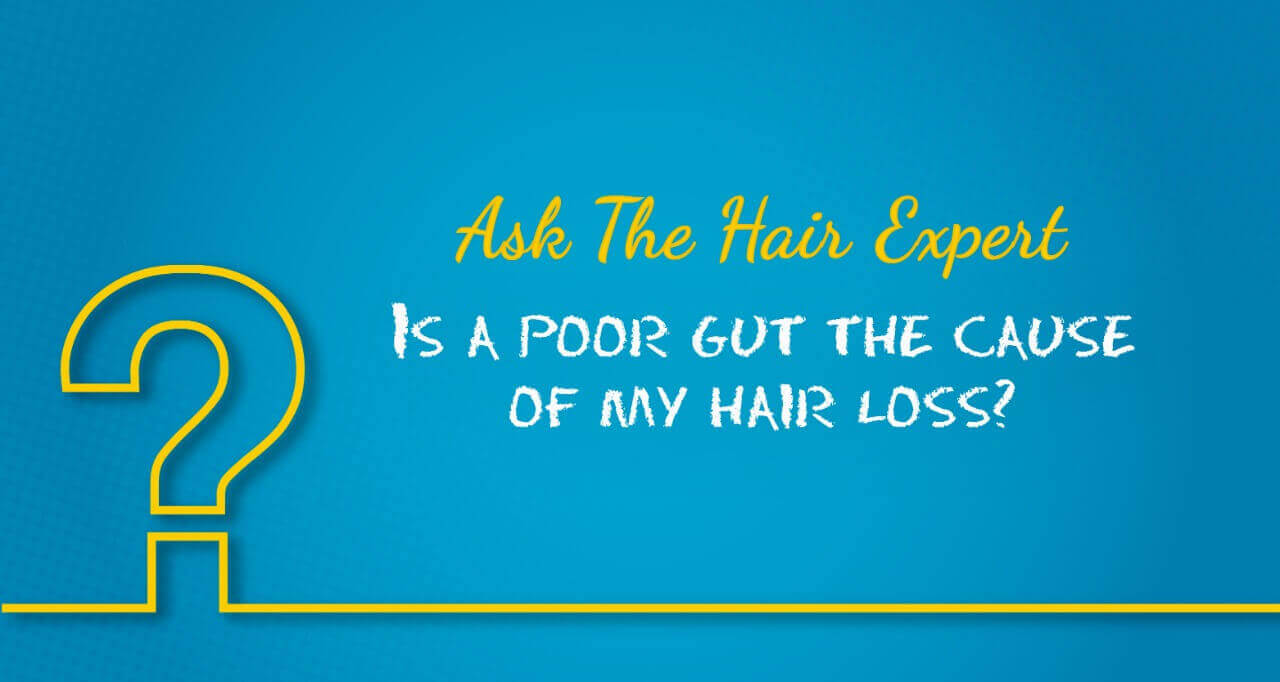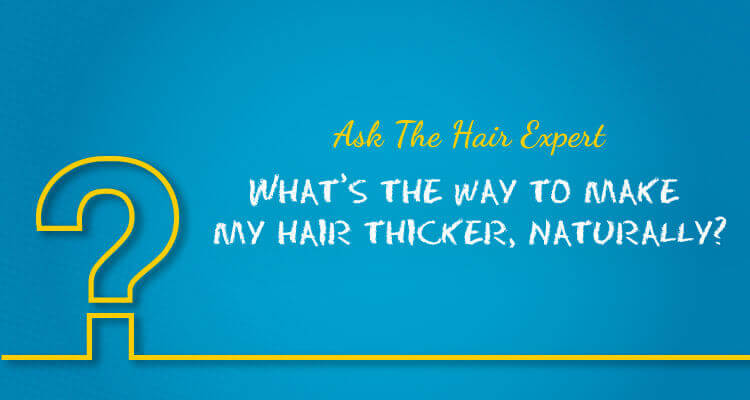Growing old doesn’t always sound appealing, does it? It does come with its advantages, but surely has some pitfalls to attend to!
Your body, skin and hair, are amongst the things that need increased attention as you age. It is human nature to fret over outward signs of ageing! Clothes getting tighter around the hips, wrinkles on the face and neck…the list can be long and varied.
There are some things you got away with when young, but can’t escape anymore! Especially with your hair.
Grey hair, thin hair, see-through scalp, excessive hair fall, receding hairline…some words that many of you have used to describe your observation on ageing hair. Clearly it’s distressing to resign to this progression. We can completely understand the anguish with which you have written to us, asking us for guidance on the topic.
We are hence back, once again, with our ‘Ask the Hair Expert’ series; this time to address your queries on ageing, its impact on your hair, its relation to hair thinning & hair loss and how we can help you address the situation.
You asked: “Does ageing cause hair thinning & hair loss? Is there a connection between the two? How can I avoid hair thinning as I age?”
Here’s the answer from the Hair Experts.
Hair does undergo changes, as does your body, with age. Necessary steps if taken under the guidance of a Trichologist can help you protect and maintain healthy hair & scalp even as you age.
So, let’s first understand what happens to your hair as you age, the relation of ageing to hair thinning and hair loss, what can be done to maintain your hair against such age-related hair concerns, and some handy tips on hair care!
So how does ageing affect hair?
Ageing of hair can be observed most often as a change in hair colour, texture, thickness and length.
Change in Hair colour – Greying
The most common tell-tale sign of ageing is the greying of hair. This happens because of the decrease in melanin production by the hair follicles.
Graying or greying, as spelt in different English-speaking countries, refers to the natural process of the change in hair colour as you age. It is progressive, permanent and not naturally reversible. In some cases, it happens prematurely too.
We get our hair colour from this pigment, melanin. With age, the follicles make lesser melanin resulting in hair colour becoming gradually lighter, eventually turning grey/white. This happens to facial and body hair too, but normally later than the hair on your scalp.
Greying is largely dictated by your genes. When you grey can depend a lot on your ancestral traits! It also depends on other factors such as lack of nutrition, major illnesses or certain medical conditions, mental stress, Other lifestyle choices like smoking, faulty diet, excessive use of hairdryers and certain hair styling products and exposure to harsh chemicals, toxins and pollutants. All of these can lead to damage to the melanin-producing cells, melanocytes, triggering greying. As you age, some of these factors affect you more and aggravate the greying process, which is otherwise quite natural.
Change in texture and tenacity
Essential oils and blood supply travels through the hair follicles and they naturally coat our hair with the much-needed layer of protection, also giving it the sheen of health. The oil glands produce less sebum as you age, resulting in hair that is drier and rougher in texture. The cuticle, your hair’s outermost covering, becomes increasingly fragile. A decrease in keratin levels, which happens as you age, leaves your hair weaker and duller. Your hair loses its elasticity, making it prone to breakage.
This also happens due to lack of nutrition and hydration. Your body’s absorption capacity too changes as you age. Those with nutritional deficiencies such as iron, calcium, vitamin D, biotin deficiencies often observe dry and brittle hair.
Hair Thinning & Hair Loss
This has to do with the A/T ratio (anagen-telogen ratio) that indicates the rate of hair growth and fall on your scalp. Do read our blog on the hair growth cycle and hair anatomy to understand the concept better.
During the hair growth cycle, your hair grows thinner and falls out during the Telogen phase. New hair then gets generated and it replaces the lost hair. As you age, naturally, the rate at which new hair replaces the fallen hair slows down. When you age, each hair spends more time in the resting phase, which means you shed hair faster than the speed at which the growth is happening. It is also to be noted that hair follicles, too, decrease in size with age. They hence produce finer/thinner hair, leading to an appearance of varying degrees of baldness. This is especially the case in men.
While thinning of hair is a natural sign of ageing and need not necessarily indicate any major problem, it is good to be on the watch out.
Hormonal changes in the body as you age also impact the hair growth cycle and the duration of each of the three phases that your hair normally goes through. For instance, it is fairly common for women undergoing menopause to experience both hair thinning and hair loss. Also, while the hair on the scalp sees thinning, facial hair may become more noticeable, due to a decrease in estrogen.
If you notice excessive hair loss, you could be undergoing conditions such a diffuse hair loss, male or female pattern thinning, telogen effluvium. These are best diagnosed by a trichologist.
MPT and FPT are the most common cause of hair loss and it typically starts in the 40s. It is progressive and if unattended leads to hair loss that can become irreversible. Do read our blogs on hair loss in men and women, to understand this better.
Solutions to tackling hair loss are aplenty now thanks to advancements in the field of trichology. You have pioneers such as RichFeel in India providing a variety of personalised solutions to handle hair thinning and hair loss. Gone are the days when you had to grapple with and resign to hair loss. Hair fertility treatments is a reality now. So do not hesitate to seek professional help. The sooner you intervene the better you can manage your hair’s health and life.
Here are some basic tips that we recommend to combat hair thinning and hair loss on your own:
Manage stress
Stress is the most common cause that aggravates hair and scalp concerns. Find your own way to manage and reduce stress. Be it meditation, yoga, zumba, dancing, running or listening to music. Destress to ensure your tresses aren’t stressed!
Eat healthy and stay hydrated
You are what you eat. Your hair is what you eat. Healthier your diet, happier your hair. Have your hair foods right and you are on your way to hair that is full of life. Drinking adequate water and keeping your hair hydrated is also very important. Dehydration can cause havoc to your body and hair. Keeping your body hydrated is a good way to combat scalp and hair dryness which tends to happen with age.
Exercise regularly
They say that there is nothing that can beat the blues (both physically and mentally) as regular exercise. Exercise makes your body release chemicals called endorphins, commonly known as happy hormones! This helps your mind stay destressed and your body be agile, active, good on metabolism, and thus helps your hair stay healthy.
Avoid heated styling equipment and products
Being addicted to hair trends has its own ill effects on your hair. With age, as mentioned above, your hair growth cycle is already under stress. Using heated styling equipment and chemical treatments/products will only aggravate the condition. Ageing hair simply cannot withstand the same kind of styling stress as it did when you were perhaps younger. So be wise in using such equipment and hair products!
Haircare regimen – oil, wash, condition, air dry!
Maintaining hair does not need any fancy regimen; just a regular hair care regimen that suits your hair & scalp condition (your trichologist can help you identify what’s right for you) will do. Wash your hair the right way – use the right oil, in the right frequency, use the right shampoo & conditioner to wash regularly, and when done, towel & air dry your hair, for best results.
Hair supplements
Your nutritional requirements undergo a change as you age. The absorption capacity of your body changes, as with hormonal changes. You need to pay more attention to whether your diet is giving you the needed nourishment, whether the right nutrients are being absorbed in your stream and in turn reaching your hair. Diet & nutrition have a direct impact on your hair.
A trichologist will understand your lifestyle, medical case history and your hair condition, and will prescribe the right natural hair supplements for you. Remember, that too much of a vitamin/mineral is also not good for you. So we will definitely not recommend self-prescription.
Tricho Treatments
Thanks to the growth of Trichology as a science, there are scientific solutions to your hair and scalp problems. Treatments and solutions are now available to tackle hair thinning, hair fall, baldness – both surgical and non-surgical solutions, instant permanent scalp covers, hair colour damage treatment and hair fibres that can camouflage your scalp in 30 seconds!
Half-yearly Tricho check-up
A consultation with the Trichologist can help with the right diagnosis and course of treatment/solution for you. Just as you have an annual health check-up or a quarterly dental clean-up, do chart a half-yearly tricho check-up in your calendar.
This simple exercise can be a great game-changer for you and your hair. This would help keep track of changes that your body, as you age, is going through (and the impact of it on your hair) and help intervene in a timely manner when required.
Remember, each individual’s hair & scalp condition is different from the other. One’s ageing progression is not the same as the other. One solution doesn’t fit all! The way each individual’s hair reacts to ageing, internal and external factors, products, treatments, varies from person to person. A trichologist is someone who understands this, is an expert on hair and scalp concerns, and hence the right person to guide you on this subject.
And with that, we sign off today! For more on hair & scalp concerns, and for all things ‘Hair’, do follow our blogs on hair loss, hair care, treatments & solutions, and interesting hair trivia!
Connect with us on social media on the links below. Do leave your questions & comments and we will address them all, just as we have done today!



